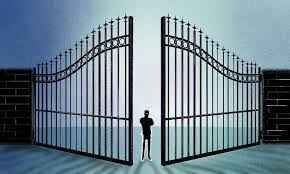Legitimizers…
This is a chapter from my unpublished book, The Cowboy Way of Leadership. I would love to hear your reaction…
Number 57 was a crook horn cow owned by my Aunt Neta. When we worked her cows, Number 57 always made her way to the front of the line. She was an old cow who had been to the pens many times; she knew the way and the drill. With her in the lead, the cowboy’s job was easy. In fact, we had to play catch up. More than once, Number 57 had the cows in the pens waiting for us!
One year, Number 57 was bitten by a rattlesnake and died. The next time we worked cows at Aunt Neta’s, it was a disaster. There was no one to show the way.
Most groups and most organizations have a “lead cow.” We call them “Legitimizers.” These are people who give guidance and permission to go in a specific direction.
John Maxwell tells a about a legitimizer named Claude. Claude was a member of John’s first church. He had been there long before John became pastor; he would be there long after John left. John quickly learned that if he wanted something done, he needed to first suggest it to Claude. If it was a good idea, Claude would take the lead. If it was a bad idea (and every leader has some!), Claude would re-shape the idea to make it a good one, or help it die a quiet death.
Every leader depends on the legitmizers. It may be an executive assistant who has been with the company before you were born but knows where all the bodies are buried. It may be the “number two” man who has outlasted three “number one” men. It may be a senior volunteer. It may be the board member who gives the most money to your organization. It may be your best customer. They are out there, and they can make your leadership look brilliant or inept. One good lead cow is worth about three cowboys!
Discovering Legitimizers
Most legitimizers are never titled that way. You have to discover them. Pay attention to who speaks and shuts off debate. Listen to people talk about who is most admired in your company. Watch the spheres of influence – who hangs out outside of your work; who gathers in the break room; which class socializes on a monthly basis.
When I consult with organizations, my initial workshop always includes these questions:
“Who are the five most influential people in this organization?”
“Who are five people who think they are would be listed as influential, but aren’t on the list?”
I want to know who really influences the way people think. I want to know who thinks they do, but really is an irritant. This helps me not listen to the “squeakiest wheel” who turns everyone else off. I learn to pay attention to people who have real influence.
Relating to Legitimizers
True legitimizers have an allegiance to the organization and its people. If, as a leader, you have pure motives of wanting to help the organization and its people, you are on the same side as the legitimizers.
Spend time with legitimizers. Ask them what they like in the organization. Ask them what they think needs to be changed. Ask what they hope to see happen.
Run ideas by them. Ask them about positives and negatives. If you don’t receive much input back, it’s probably a sign they have doubts and are not sure how you will receive the truth. Mine for the truth! My goal is to have a face-to-face conversation with every legitimizer in our church at least once a year.
If a legitimizer has a crisis, I want to be present for them. This is my way of demonstrating I care about them not just for what they can do for me or the organization; but for them as a person.
When the Legitimizers say “No”
I’ve seen leaders get in trouble because they assumed anyone who disagreed with an idea was an enemy. To disagree is not to oppose.
Our staff was trying to fix some issues with our Sunday morning schedule. We brought our proposal to our legitmizers, who unanimously gave us a “thumbs down.” Their rationale was it was too much change for too many people.
Some of the staff members had harsh reactions. Time was needed to let things settle. About three months later, we got major pushback on another, smaller initiative. It turned out the church was unsettled and felt like the staff was pushing too hard. The legitimizers knew what we didn’t.
If a legitimizer says “no,” assume it is for a good reason. Find out the reason!
One of the strangest things about legitimizers: Sometimes they may say “no” but still give permission for you to do what you want. Legitimizers can be thought of as “gatekeepers;” they may tell you are going in the wrong direction, but they still open the gate for you to go. They may not support you, but as long as they don’t oppose you, you can make progress.
The Value of a Legitimizer
After I had been pastor for three years, our church voted to re-locate. A friend told me that the only thing harder on a church than relocation was the discovery that the pastor was having a homosexual affair! We succeeded, largely because a key legitimizer, Miss Jo, the matriarch of the church, decided relocating was the right decision. When leaders of an opposition movement approached her about being part of a movement to buy the old building and start a new church. She replied, “I’ve already paid for this old building once. I’m not going to pay for it again!” She persuaded other key legitimizers not to form an opposition movement, but to wait and see how things turned out. They did wait, we gained momentum, and we gathered the support of almost all of the legitimizers over the next three years.
Before the move was completed, however, Miss Jo was killed in an accident. It was a terrible blow to me personally – and to the church. We lost one of our key legitimizers. There was no one there to say, “I’ve been through this before. It will be okay. Just follow me.”
You may walk into an organization that has lost a key legitimizer. Or your predecessor may have driven out previous legitimizers. Or your headquarters may have shifted people around so quickly, no legitmizers can be found. If you can’t find the legitimizer you need, the leaders have to do more careful work. No one in the herd is helping you.
In this case, you, as the leader, can draft some temporary people who have the potential to be legitimizers. Give them a chance to have some influence. Let them lead a group and get a win under their belt. See if they can become the person others look to. If they grow to that level, great. If they don’t, seek out another person who might be a legitimizer.
I consulted with a church that had experienced rapid growth and had recently purchased a new building. But the growth was slowing and giving was not keeping up with the need. When I met with the church leaders, I discovered that two key legitimizers had stepped down because of health. Another key legitimizer had been transferred. When church leaders were asked to name the most influential people in the church, they could only name people on the church staff payroll. There was no one left to help the church find its way and assure people things would be alright.
Jesus and Legitimizers
This worked a little different for Jesus. He called His legitimizers “disciples.” Their purpose? They were witnesses to everything He had done. They could say, “We saw this. It happened. You can trust us.”
When the Jesus movement started, these disciples spent time teaching people about Jesus. As the movement spread, they were able to make decisions about expanding the movement beyond Jerusalem because Jesus had told them this was His intent.[i] When conflict arose in the early church about whether non-Jews should follow the same rules as Jews, the disciples again acted as legitimizers and laid out both freedoms and expectations.[ii]
Did Jesus need them? Probably not. But He chose to work through human influencers. They led the way into the pens. They led the way to the future.
The Final Big thought: One good lead cow equals three good cowboys.
[i] Acts 11:17-18
[ii] Acts 15:1-29









